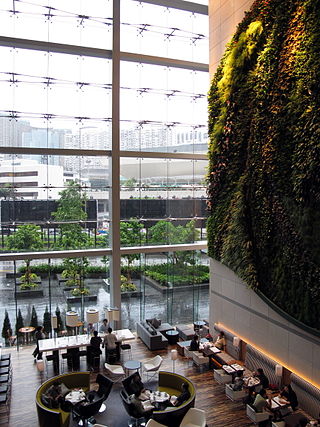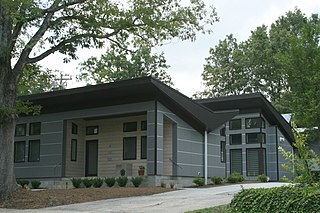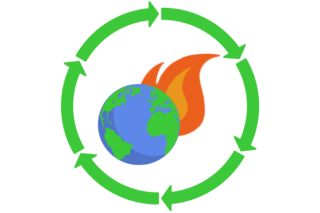
Ecotourism is a form of tourism marketed as "responsible" travel to natural areas, conserving the environment, and improving the well-being of the local people. The stated purpose may be to educate the traveler, to provide funds for ecological conservation, to directly benefit the economic development and political empowerment of local communities, or to foster respect for different cultures and human rights.

Greenwashing, also called green sheen, is a form of advertising or marketing spin that deceptively uses green PR and green marketing to persuade the public that an organization's products, goals, or policies are environmentally friendly. Companies that intentionally adopt greenwashing communication strategies often do so to distance themselves from their environmental lapses or those of their suppliers.

Minamata is a city located in Kumamoto Prefecture, Japan. It is on the west coast of Kyūshū and faces Amakusa islands. Minamata was established as a village in 1889, re-designated as a town in 1912 and grew into a city in 1949. As of March 2017, the city has an estimated population of 25,310 and a population density of 160 persons per km2. The total area is 162.88 km2.

Event management is the application of project management to the creation and development of small and/or large-scale personal or corporate events such as festivals, conferences, ceremonies, weddings, formal parties, concerts, or conventions. It involves studying the brand, identifying its target audience, devising the event concept, and coordinating the technical aspects before actually launching the event.

The Blue Flag is a certification by the Foundation for Environmental Education (FEE) that a beach, marina, or sustainable boating tourism operator meets its standards. The Blue Flag is a trademark owned by FEE, which is a not-for-profit non-governmental organisation consisting of 65 organisations in 77 member countries.

Eco-Schools is an international programme of the Foundation for Environmental Education (FEE) that aims to “empower students to be the change our sustainable world needs by engaging them in fun, action-orientated, and socially responsible learning.”
Sustainable procurement or green procurement is a process whereby organizations meet their needs for goods, services, works and utilities in a way that achieves value for money on a life-cycle basis while addressing equity principles for sustainable development, therefore benefiting societies and the environment across time and geographies. Procurement is often conducted via a tendering or competitive bidding process. The process is used to ensure the buyer receives goods, services or works for the best possible price, when aspects such as quality, quantity, time, and location are compared. Procurement is considered sustainable when organizations broadens this framework by meeting their needs for goods, services, works, and utilities in a way that achieves value for money and promotes positive outcomes not only for the organization itself but for the economy, environment, and society.
Sustainable seafood is seafood that is caught or farmed in ways that consider the long-term vitality of harvested species and the well-being of the oceans, as well as the livelihoods of fisheries-dependent communities. It was first promoted through the sustainable seafood movement which began in the 1990s. This operation highlights overfishing and environmentally destructive fishing methods. Through a number of initiatives, the movement has increased awareness and raised concerns over the way our seafood is obtained.

EarthCheck, previously operating under the name EC3 Global, is a globally recognised group specialising in benchmarking, certification, and advisory services. Its primary focus lies in the environmental and scientific dimensions of the travel and tourism sector. Established over 30 years ago, EarthCheck collaborates with prominent research institutions and universities globally to address sustainability and climate change challenges in tourism destinations and businesses.
Audubon International is a not for profit 501(c)(3) environmental education organization based in Troy, New York. Established in 1987, the organization works with communities, developments, resorts, and golf courses in 36 countries to plan and implement sustainable natural resource management practices, as well as receive public recognition for employing sound environmental stewardship.

An eco hotel, or a green hotel, is an environmentally sustainable hotel or accommodation that has made important environmental improvements to its structure in order to minimize its impact on the natural environment. The basic definition of an eco-friendly hotel is an environmentally responsible lodging that follows the practices of green living. These hotels have to be certified green by an independent third-party or by the state they are located in. Traditionally, these hotels were mostly presented as ecolodges because of their location, often in jungles, and their design inspired by the use of traditional building methods applied by skilled local craftsmen in areas, such as Costa Rica and Indonesia.
Responsible tourism is a relatively modern concept in the Kingdom of Thailand that took root in the late-1990s. It is underpinned by the belief that tourism should develop in a manner that minimizes negative impacts on local communities, and wherever possible ensure that a positive symbiosis exists between hosts and visitors. Responsible travel promotes a respect for indigenous culture, the minimization of the negative environmental impacts of tourism, active participation in volunteering to assist local communities, and the structuring of businesses to benefit the final service provider rather than an international agent.
The Green Council (GC) is a non-profit, non-partisan environmental association of Hong Kong formed by a group of individuals from different sectors of industry and academics who share a vision to turn Hong Kong into a green city for the betterment of the future.

A green home is a type of house designed to be environmentally sustainable. Green homes focus on the efficient use of "energy, water, and building materials". A green home may use sustainably sourced, environmentally friendly, and/or recycled building materials. This includes materials like reclaimed wood, recycled metal, and low VOC paints. Additionally, green homes often prioritize energy efficiency by incorporating features, such as high-performance insulation, energy-efficient appliances, and smart home technologies that monitor and optimize energy usage. Water conservation is another important aspect, with green homes often featuring water-saving fixtures, rainwater harvesting systems, and grey water recycling systems to reduce water waste. It may include sustainable energy sources such as solar or geothermal, and be sited to take maximum advantage of natural features such as sunlight and tree cover to improve energy efficiency.
Environmental certification is a form of environmental regulation and development where a company can voluntarily choose to comply with predefined processes or objectives set forth by the certification service. Most certification services have a logo which can be applied to products certified under their standards. This is seen as a form of corporate social responsibility allowing companies to address their obligation to minimise the harmful impacts to the environment by voluntarily following a set of externally set and measured objectives.

Hotel ratings are often used to classify hotels according to their quality. From the initial purpose of informing travellers on basic facilities that can be expected, the objectives of hotel rating have expanded into a focus on the hotel experience as a whole. Today the terms 'grading', 'rating', and 'classification' are used to generally refer to the same concept, that is, to categorize hotels.
Eco-friendly dentistry aims at reducing the detrimental impact of dental services on the environment while still being able to adhere to the regulations and standards of the dental industries in their respective countries.
Ga Mone Pwint is a Burmese conglomerate. Ga Mone Pwint is presently headed by Managing Director Nay Lynn Oo. The company runs major shopping centers in Yangon. Established in 1991, the company has grown to become one of the leading retail chains in the country, known for its wide range of products and customer-centric services.

A climate-friendly school, or eco-school, encourages the education of sustainable developments, especially by reducing the amount of carbon dioxide produced in order to decrease the effects of climate change. The term "climate-friendly school" arose and was promoted by the United Nations' education for sustainable development program (ESD).

Green Key Global is an international eco-label which certifies hotels and venues operating in 20 countries. The industry-run group is based in Ottawa and has over 1,800 participating facilities. The system is based on self-reporting, with facilities receiving a certification between one and five keys.










